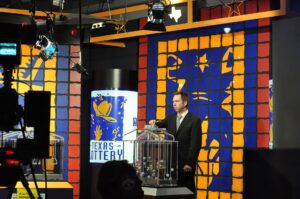By David Mullen
When a local team has success during a season, culminating in a big game like a Super Bowl or NCAA Championship, legislators love to jump on the bandwagon and make a friendly wager as a show of support.

Photo courtesy of Wikipedia
In 2017, Gov. Greg Abbott bet Texas beer and barbeque against a selection of Napa Valley wines anted up by then-California Gov. Jerry Brown over the outcome of the World Series between the Houston Astros versus the Los Angeles Dodgers.
But if a Texas voter had made the same bet, they would have committed a Class A Misdemeanor under Texas Penal Code 47.04 and be subject to a penalty of up to a year in jail and a fine up to $4,000. Not to mention possible violations of Federal interstate gaming laws.
When the Astros won (amid a cheating scandal), I can only hope that Gov. Abbott matched a Saintsbury Pinot Noir with his beef brisket as his legislators continue to tease Texas sports bettors like a three-game parlay.
While much attention was given to the Texas legislature over matters of carrying handguns without licenses and making major changes in the way people will vote, another session ended without sports gaming being approved. One can assume it will not be reconsidered in the special session that Gov. Abbott has promised this summer, meaning the next time a state gaming law will be considered is 2023. The bill, in its current state, earmarked 10 percent of gaming profits for public education.
House Joint Resolution 133, proposed by Rep. John Kuemple, R-Seguin, and supported on the floor in rare bi-partisanship by Sen. Carol Alvarado, D-Houston, would have let the voters decide whether to allow casino and sports gaming in Texas. The bill was backed by financial support and lobbying interests from Las Vegas Sands Corp. (LVS), the casino behemoth looking at, as they say in a Vegas sportsbook, “a futures bet.”
I reached out to both Sen. Alvarado and Rep. Kuemple for comment. Two confirmed appointments with Sen. Alvarado were not kept and Rep. Kuemple’s office did not respond to my request.
LVS wants to be on the forefront of building casino hotels in the major metro areas of Dallas-Fort Worth, Austin, San Antonio and Houston. LVS promises to be great citizens, claiming that tens of thousands of new construction jobs and later even more hotel and casino positions would be available to Texans.
The bill would also have allowed the three existing federally approved casinos on Native American reservations in Texas to expand their gaming options to include slot machines, which would have increased their revenue.
Local sports teams including the Dallas Cowboys, Dallas Mavericks and Texas Rangers have been vocal in their support of sports gaming. Their respective leagues have suddenly embraced sponsors like DraftKings and FanDuel, which were once taboo.
Betting lines are regularly shown on network sports reports, and ESPN and Fox have dedicated programming targeting bettors. The Rangers, Mavericks and Dallas Stars games are broadcast locally on Bally Sports Southwest, owned by Sinclair Broadcasting. In November 2020, Sinclair entered into an agreement with casino operator Bally’s Corporation to acquire naming rights for the network.
I remember when Texas initiated a state lottery in May 1992. Opponents feared that “it was the end of the world as we know it.” But it has been extremely successful by all measures. In FY 2020, the Texas Lottery grossed $6.704 billion in sales, an increase of $452.5 million (7.2 percent) over FY 2019. The FY 2020 achievement, according to data from the Texas Lottery Commission, also resulted in a record total contribution of $1.684 billion for Texas education and veterans.
Only four other U.S. states do not allow casino gaming, and none are even close to the size — in population or spending power — of Texas. Utah, Tennessee, Hawaii and Alaska forbid casino gaming. Texas has 17 million more people than those four states combined.
More importantly, according to statistics from LVS, Texans spend approximately $2.5 billion at casinos in Louisiana, Arkansas, Oklahoma and New Mexico. Notice that does not even consider what Texans spend in Las Vegas. And then there is the dirty little secrets of illegal bookmaking and offshore betting. Shhh! Don’t tell the legislators. That’s worth billions of dollars, too.
Despite being proposed by a Republican, key Republican leaders are opposing the move to a gambling vote while billions of gaming dollars head out of state.
According to website casino.org, Lt. Governor Dan Patrick-R said in a radio interview, “It [the bill] won’t see the light of day.” Mark P. Jones, a political science fellow at Rice University, told a website that: “At LVS casinos, it is true that in the end, the house always wins. In the Texas Senate, however, when it comes to determining which legislation does not make it to the floor, Lt. Gov. Dan Patrick always wins.”
In a poll conducted jointly by UT-Tyler and The Dallas Morning News, 57 percent of Texans support casino gambling with only 29 percent opposed and 14 percent indifferent. Similar support is given to sports gaming. Apparently, Lt. Gov. Patrick has difficulty reading a tout sheet.
Such has been the fate of gaming legislation, which is up for debate every other year in the Texas legislature but finds the same result. In gambling jargon, it “craps out.” And that’s too bad, because betting on the success of Texas betting is a guaranteed winner.
Note: The Texas Department of Health Services website has a page dedicated to problem gambling that provides the public with information and referral sources for help at dshs.texas.gov.
